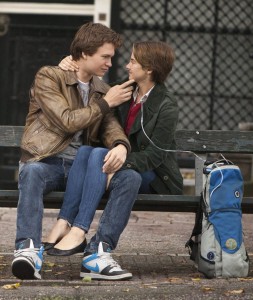Cancer
Carol and I went to the movies! We don’t do that a lot; we usually watch them at home. This one, however, drew me to the theater and I drug Carol along. “The Fault in our Stars”‘ is a romance and story about cancer and dying young. I rate movies by how much I find myself thinking about them. I am still thinking about this one days later.
It has a fine story, good directing and photography, and a great cast. Shailene Woodley has the main role. A reviewer said she is as lovely as a June day, and the woman can act. The other cast members are good, but they are playing backup.
Two teens with cancer meet at a support group, and they fall in love. The power of the movie is in exploring how a terminal illness forces one to explore meaning, pain, death, and love in an intensely personal way. Gus and Hazel are bright and funny as they confront the tragedy in their young lives.
The movie is a tearjerker, a sick flick, sentimental, and somewhat too right. With that, it is honest, fun, sad, and lovely. If you can’t get to the theater, put it in your queue. I doubt if I will read the book.
The movie has more significance for me because I lost my mother to cancer when I was a junior in high school. She was stricken with ovarian cancer at menopause. Initially diagnosed as an ulcer because of her abdominal pain, our family doctor missed the cancer because he was dealing with a paranoid psychosis.
By the time my parents realized what was wrong and sought out the best cancer doctor in Grand Junction, it was too late. Given the state of cancer treatment in the 1950’s, it was probably too late anyway. The standard routine ensued, surgery, radiation, some primitive chemotherapy, and over a year of debility, pain, and wasting.
My family did not deal with cancer as well as Gus, Hazel, and their families. Our strategy was denial. Just act like nothing is wrong. The elephant is rotting in the corner of the room, but ignore it. I would come home from school, go into the bedroom where she lay wasting away, give a upbeat account of my day, and stay away.
It took well over a year for her to die. The day she died, my father called me out of an assembly at school. I had to walk from the front of the auditorium to the exit with everyone’s eyes on me. I went numb. I stayed numb. No conversations about anything. The only genuine expression of sympathetic came from the football coach. I am so grateful for what he said, more than fifty years later.
I floundered. I listened to jazz, Tchaikovsky’s Sixth, and read existentialists. I flunked trigonometry my senior year, explored religion (didn’t work), flunked out of the University of Colorado, tried Mesa College, drank a lot, and joined the Army. Time does heal, and the Army gave me some sense of purpose while I grew up.
I didn’t deal with the loss of my mother until I saw “Brian’s Song” in 1971. Watching that movie, about Brian Piccolo and his great friend Gayle Sayers, the floodgates opened up. I did not cry when my mother died, I was shut down emotionally. Years later, I cried. What a release. I mourned her loss for the first time. The lesson: deal with the feelings when it is happening. The more painful the feelings are the more important it is. Talk about it. That is what happened in “The Fault in our Stars”. It did not happen in my life and I paid for it for years.
